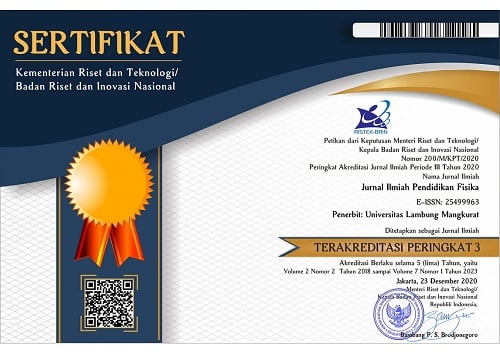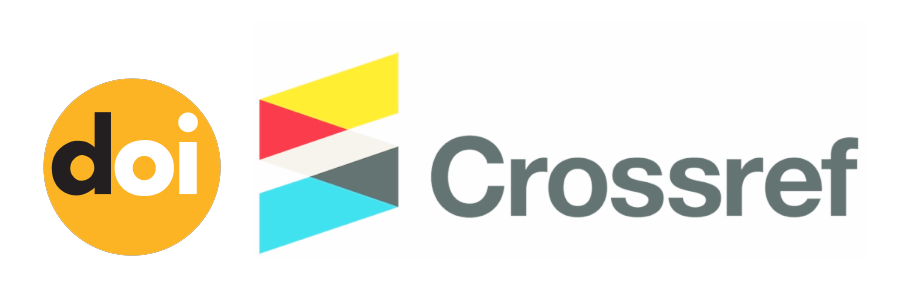The Effectiveness of the POGIL Learning Model on Simple Harmonic Motion Topic to Enhance Students' Science Process Skills
Abstract
The lack of training in students' science process skills indicators in physics subjects has resulted in a majority of students in one of the high schools in Banjarmasin, grade X MIPA, having relatively low science process skills. This study aims to describe the effectiveness of the POGIL learning model and assess the achievement of students' science process skills. This study used a one-group pretest-posttest design. The results showed that using the POGIL model based on the n-gain calculation had a high effectiveness category with a value of 0.73 and trained students' science process skills, as indicated by an increase in the achievement of science process skills, which had a very good category. Based on these results, using the POGIL model can provide benefits in practicing students' science process skills.
Keywords
Full Text:
PDFReferences
Abdullah, H., Malago, J. D., & Arafah, K. (2021). The implementation of physics learning through online mode during pandemic covid-19 using metacognitive knowledge-based materials. Jurnal Pendidikan IPA Indonesia, 10(2), 220–227. https://doi.org/10.15294/jpii.v10i2.28583
Aiman, U., Hasyda, S., & Uslan. (2020). The influence of process oriented guided inquiry learning (POGIL) model assisted by realia media to improve scientific literacy and critical thinking skill of primary school students. European Journal of Educational Research, 9(4), 1635–1647. https://doi.org/10.12973/EU-JER.9.4.1635
Ali Bin-Hady, W. R., Abdu Nasser, A. N., & Al-Kadi, A. T. (2020). A pre-experimental study on a process-genre approach for teaching essay writing. Journal of Language and Education, 6(4), 44–54. https://doi.org/10.17323/jle.2020.10347
Andriani, S., Nurlaelah, E., & Yulianti, K. (2019). Pengaruh model pembelajaran inkuiri terbimbing berorientasi proses (POGIL) terhadap kemampuan berpikir logis matematika siswa. Jurnal Fisika : Seri Konferensi, 4, 1–5.
Ansori, T., Wasis, W., & Nasrudin, H. (2019). Development of physics learning instrument with model project based learning to train students’ critical thinking skills. International Journal of Multicultural and Multireligious Understanding, 6(5), 74. https://doi.org/10.18415/ijmmu.v6i5.1046
Arikunto, S. (2016). Dasar-dasar evaluasi pendidikan edisi 2. Bumi Aksara.
Arsy, Y. N., & Octarya, Z. (2022). Efektivitas strategi pembelajaran eksperimen berbasis metode process oriented guided inquiry learning. Journal of Natural Science Learning, 1(1), 68–74.
Cohen, L., Manion, L., & Morrison, K. (2018). Research methods in education (Eighth edition). Routledge.
Dahlia Yuliskurniawati, I., Ika Noviyanti, N., Rosyadah Mukti, W., Mahanal, S., & Zubaidah, S. (2019). Science process skills based on genders of high school students. Journal of Physics: Conference Series, 1241(1). https://doi.org/10.1088/1742-6596/1241/1/012055
Dani, A. U., & Qurana. (2022). Pengaruh model pembelajaran process oriented guided inquiry learning terhadap pemahaman konsep fisika. Jurnal Pendidikan Fisika, 10(1), 56–60.
Darmaji, D., Kurniawan, D. A., & Irdianti, I. (2019). Physics education students’ science process skills. International Journal of Evaluation and Research in Education (IJERE), 8(2), 293. https://doi.org/10.11591/ijere.v8i2.16401
Dionisius, I. M. K., Margunayasa, I. G., & Kusmariyatni, N. N. (2019). Pengaruh model pembelajaran POGIL terhadap keterampilan proses sains. Mimbar PGSD Undiksha, 7(3), 271–278.
Elnada, I. W., Mastuang, M., & M., A. S. (2016). Meningkatkan keterampilan proses sains dengan model inkuiri terbimbing pada siswa kelas x PMIA 3 DI SMAN 3 Banjarmasin. Berkala Ilmiah Pendidikan Fisika, 4(3), 228. https://doi.org/10.20527/bipf.v4i3.1851
Fachrunisa, Z. (2018). Pengaruh model POGIL berbantu virtual laboratorium terhadap keterampilan proses sains siswa pada konsep gerak harmonik sederhana. Repository.Uinjkt.Ac.Id. http://repository.uinjkt.ac.id/dspace/handle/123456789/43173%0Ahttps://repository.uinjkt.ac.id/dspace/bitstream/123456789/43173/4/Ziah Fachrunisa 1113016300045.pdf
Geiger, M. (Peggy). (2010). Implementing POGIL in allied health chemistry courses: insights from process education. International Journal of Process Education, 2(1), 19–34.
Ghaida, G., Zainuddin, Z., & Salam, A. (2021). Pengembangan bahan ajar fisika menggunakan model POGIL dengan strategi ARCS untuk melatih keterampilan proses sains peserta didik. Jurnal Ilmiah Pendidikan Fisika, 5(2), 138–152.
Hake, R. . (1998). Interactive-enggagement versus traditional methods : A six thousand-student survey of mechanics test data for introductory physics courses. American Journal of Physics, 66(1), 64–74.
Hanson, D. M. (2007). Designing process-oriented guided-inquiry activities. Department of Chemistry. Stony Brook University.
Hombing, R. B., Yennita, & Sahal, M. (2017). Pengaruh model pembelajaran inquiry training pada materi gerak harmonik sederhana terhadap keterampilan proses sains kelas x sma negeri 1 tualang. Jurnal Online Mahasiswa, 6–9.
Huck, S. . (2012). Reading statistics and research (6th ed). Pearson.
Kane, S. N., Mishra, A., & Dutta, A. K. (2016). Preface: International conference on recent trends in physics (ICRTP 2016). Journal of Physics: Conference Series, 755(1). https://doi.org/10.1088/1742-6596/755/1/011001
Karimah, S. N., & Nurita, T. (2020). Penerapan pembelajaran process oriented guided inquiry learning (POGIL) untuk meningkatkan keterampilan proses sains peserta didik. Pensa E-Jurnal, 8(2), 115–119.
Kemendikbud. (2016). Salinan Lampiran Peraturan Menteri Pendidikan dan Kebudayaan Nomor 22 Tahun 2016 Tentang Standar Proses Pendidikan Dasar dan Menengah.
Kirom, A. (2017). Peran guru dan peserta didik dalam proses pembelajaran berbasis multikultural. Al Murabbi, 69–80.
Mahjatia, N., Susilowati, E., & Miriam, S. (2021). Pengembangan LKPD berbasis STEM untuk melatihkan keterampilan proses sains siswa melalui inkuiri terbimbing. Jurnal Ilmiah Pendidikan Fisika, 4(3), 139. https://doi.org/10.20527/jipf.v4i3.2055
Marisyah, M., Zainuddin, Z., & Hartini, S. (2016). Meningkatkan keterampilan proses sains dan hasil belajar siswa pada pelajaran ipa fisika kelas viii b smpn 24 banjarmasin melalui model inkuiri terbimbing. Berkala Ilmiah Pendidikan Fisika, 4(1), 52. https://doi.org/10.20527/bipf.v4i1.1044
Mellyzar, M., Alvina, S., & Zahara, S. R. (2022). Influence of POGIL and MFI models on science literacy and science process skills for junior high school. Jurnal Penelitian Pendidikan IPA, 8(4), 2201–2209. https://doi.org/10.29303/jppipa.v8i4.2121
Moog, R.S., & Spencer, J. N. (2008). POGIL : An overview. In ACS Symposium Series (pp. 1–13).
Nurtang, H., & Haris, A. (2019). Keterampilan proses sains fisika peserta didik kelas xi sma negeri 24 bone. Jurnal Sains Dan Pendidikan Fisika (JSPF), 53–62.
Oktaria, S. A., Rahmad, M., & Anwar, L. (2023). Validity of electronic module based on process oriented guided inquiry learning (POGIL) model to train students’ science process skills. Journal of Science Education Research, 7(1), 46–54.
https://doi.org/10.21831/jser.v7i1.51600
Putri, E. R., Budiyono, & Indriati, D. (2020). POGIL model on mathematical connection ability viewed from self-regulated learning. International Journal of Evaluation and Research in Education, 9(2), 394–400. https://doi.org/10.11591/ijere.v9i2.20321
Putri, S. U. (2019). Pembelajaran sains untuk anak usia dini. Royyan Press.
Rahmadanty, F., & Wasis, W. (2020). Analisis Keterampilan Proses Sains Siswa SMA/MA dan Kaitannya dengan Pemahaman Konsep Geteran Harmonik. IPF : Inovasi Pendidikan Fisika, 09(03), 428–438.
Rahmatillah, R., Halim, A., & Hasan, M. (2017). Pengembangan lembar kerja peserta didik berbasis keterampilan proses sains terhadap aktivitas pada materi koloid. Jurnal IPA & Pembelajaran IPA, 1(2), 121–130.
Ravena, A., & Sholih. (2022). Factors affecting student learning outcomes. SEMNAS Bio-Edu, 378–387.
Rumain, B., & Geliebter, A. (2020). A Process-Oriented Guided-inquiry learning (POGIL)-based curriculum for the experimental psychology laboratory. Psychology Learning and Teaching, 19(2), 194–206. https://doi.org/10.1177/1475725720905973
Rusman. (2017). Belajar dan pembelajaran berorientasi standar Proses Pendidikan. Kencana.
Rustam, R. A., & Setijani, P. (2017). Pengaruh model pembelajaran POGIL terhadap pemahaman konsep ipa, keterampilan proses sains dan kemampuan berpikir kritis siswa smp negeri 3 pringgabaya lombok timur. Jurnal Penelitian Pendidikan IPA (JPPIPA), 3(2), 33–41.
Sani, A. R., Arafah, K., Aziz, I., Tanjung, R., & Suswanto, H. (2020). Evaluasi proses dan penilaian hasil belajar. PT Remaja Rosdakarya.
Saraswati, R. D., Kusumawardani, R., & Usman. (2018). Analisis keterampilan proses sains siswa sma yang diajar menggunakan model pembelajaran pogil dengan metode praktikum pada pokok bahasan koloid. Pros. Semnas KPK. 1, 91–93.
Şen, Ş., Yılmaz, A., & Geban, Ö. (2015). The effects of process oriented guided inquiry learning environment on students’ self-regulated learning skills. Problems of Education in the 21st Century, 66(1), 54–66. https://doi.org/10.33225/pec/15.66.54
Setyaning, Y. D., & Rosdiana, L. (2017). Penerapan model pogil untuk melatihkan keterampilan proses sains ditinjau dari hasil belajar. Pensa : E-Jurnal Pendidikan Sains, 5(02), 108–112.
Sudartik, Sutarto, & Budiarso, A. S. (2023). Pengaruh model pogil terhadap hasil belajar dan kemampuan berpikir kritis siswa smp. Jurnal Penelitian Pendidikan Dan Pembelajaran, 10(2), 121–135.
Sugiyono. (2009). Metode penelitian kualitatif, kuantitatif, dan R&D. Alfabeta.
Suyidno. (2020). Creative Responsibility Based Learning. Universitas Lambung Mangkurat.
Wahyu Rahmandani, D., Zulkarnain, I., & Asdini Sari, D. (2022). Meta analisis pengaruh model pembelajaran kooperatif terhadap kemampuan pemahaman konsep matematis peserta didik. Jurnal Pendidikan Matematika, 2759(2), 325-338 level. https://doi.org/10.20527/edumat.v10i2.14141
Widoyoko, E. P. (2017). Evaluasi program pembelajaran. Pustaka Belajar.
Zamista, A. A. (2016). Pengaruh model pembelajaran process oriented guided inquiry learning terhadap keterampilan proses sains dan kemampuan kognitif siswa pada mata pelajaran fisika. Edusains, 7(2), 191–201. https://doi.org/10.15408/es.v7i2.1815
DOI: https://doi.org/10.20527/jipf.v8i1.10097
Refbacks
- There are currently no refbacks.
Indexed by: Jurnal Ilmiah Pendidikan Fisika is licensed under a creative commons attribution-share alike 4.0 international license
Statistics Counter |
















